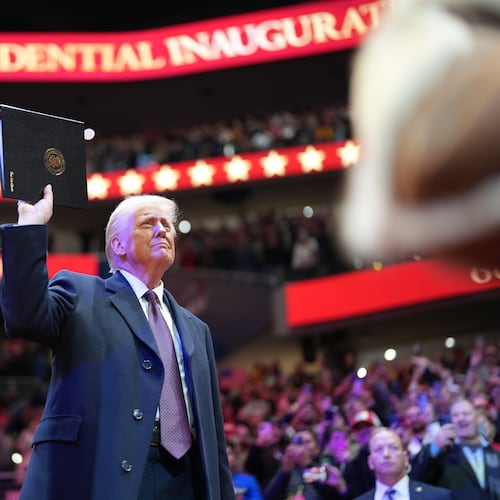Voters have grown accustomed this time of year to mailboxes stuffed with campaign flyers and voicemail clogged by robocalls.
But campaigns are turning increasingly to another way to get their message out — and to annoy some voters: text messages.
Candidates for state and local offices and related campaigns have spent about $311,000 so far in 2020 on texting services, state records show. That’s a fraction of the tens of millions spent on other forms of voter outreach.
But it’s growing fast — 2020 spending on text messaging has surpassed spending in all previous years combined, according to records from the Georgia Government Transparency and Campaign Finance Commission. And the volume of political texts may only increase as Election Day nears.
Just ask Merrie Soltis. The Dacula resident said she gets multiple political texts a day. It’s exasperating.
“Make them stop!” Soltis told The Atlanta Journal-Constitution. “I’ve already voted. Just leave me the hell alone! Why are they still texting me?”
The texting barrage comes amid one of the most hotly contested elections in years. At the top of the ballot, Republican President Donald Trump and Democrat Joe Biden are neck and neck in Georgia in several recent polls. The state’s two U.S. Senate seats also are competitive, as are several congressional races.
At the state level, Democrats see a chance to capture control of the state House of Representatives — and, with it, power over redistricting that could aid their chances in future elections. Maybe that’s why the biggest spender on text messages so far this year is the Republican State Leadership Committee.
The Washington-based group has spent more than $1 million to support Republican legislative candidates. That includes about $45,000 on texting services this year through Sept. 30, records show. Majority Makers, an independent group supported by Republicans, spent an additional $13,829.
Local candidates also have invested in texting services. Fulton County District Attorney Paul Howard (who lost in the Democratic primary) spent nearly $33,000 on texting services this year. Three superior court judges also were among the top spenders: Clayton County Judge Kathryn Powers (nearly $30,000), Fulton County Judge Rebecca Crumrine Rieder ($17,000) and Gwinnett County Judge Randy Rich ($15,200).
Chip Lake, a Republican strategist, said campaigns increasingly are turning to text messaging because it’s an effective and relatively inexpensive way to reach voters.
“It’s something you have to do in this (election) cycle,” he said. “If you’re not doing it, your opponent is. You’re going to be at a disadvantage.”
Campaigns obtain phone numbers from voter registration records and from information brokers. They use other data to target voters likely to be receptive to their message.
“There’s so much data available out there that shows I’m a Republican voter, a likely Republican voter, conservative,” Lake said. “I’m more likely to get messages from Republicans.”
Diane Jarrett of Augusta texts for Georgia Democrats and VoteVets, a group that seeks to mobilize military veterans to support liberal candidates. She works two-hour shifts, sending hundreds of individual messages.
Jarrett uses scripts provided by the organizations she volunteers for, asking whether the recipients will support Biden or Trump, reminding them that early voting has begun, asking them whether they’ll vote early or wait for Election Day. Some of the recipients respond, and she converses with them.
“Some of them can be rather crude,” she said. “Others can be rather friendly, and you get involved in a long exchange of texts.”
Count Soltis among those whose responses can be rather crude. A self-described former Republican, she now supports many Democratic candidates. So she gets messages from across the political spectrum.
Soltis works at home and can’t ignore calls and text messages to her cellphone. “Every time it rings, I have to stop what I’m doing,” she said.
So Soltis has taken to responding to political texts with profanity-laden messages.
“If I sent you some of the texts I’ve sent back, you couldn’t print them in the AJC because you’re a family newspaper,” she said.
In fact, Soltis and her friends sometimes share and compare their responses on social media. One printable example: A friend in Minnesota received a text from former University of Georgia football star Herschel Walker, urging him to support the president’s re-election.
Soltis' friend texted back: “Go Tech!” — a reference to UGA football rival Georgia Tech.
Jarrett said only 1% or 2% of people who respond to her texts are hostile. More often, they ask her to stop contacting them. When that happens, Jarrett said she puts them on a “do not contact” list.
Replying “STOP” usually will unsubscribe you from a texting list. But with more campaigns doing it, political texting is likely to become part of the normal background noise of campaign season, like flyers and robocalls.
Jarrett wants Georgia voters to know there are human beings sending those political texts.
“It’s helpful if you’re willing to participate” in a campaign, she said. “But if you’re not, just be nice and say, ‘I’d rather not do this.’ ”
Soltis is unmoved. She said she’ll continue responding to political texts with profanity.
“I am glad to know there’s an actual human being that is receiving these messages,” she said. "I want to register my absolute hatred of the whole system.
“If I’m nasty enough,” Soltis said, “maybe they’ll take me off the list and not bother me anymore.”
Staff writer James Salzer contributed to this article.
About the Author
The Latest
Featured




